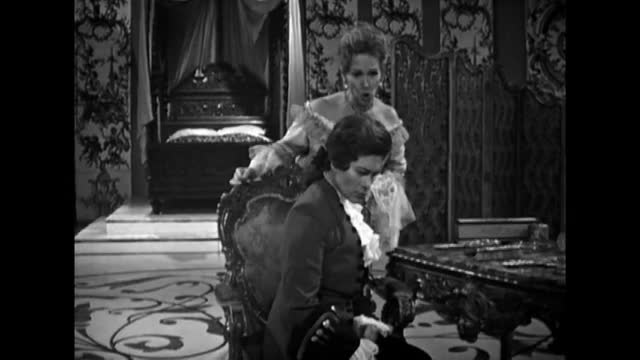Streich’s father was interned in the USSR as a German prisoner of war, while her mother was Russian; as a result she grew up to be bilingual, to her considerable advantage in her later professional career as a singer. Her family moved from Siberia to Essen and Jena in Germany, where Streich received her first singing lessons from Paula Klötzer in Augsburg. Later, in Berlin, she was a pupil of Willi Domgraf- Fassbaender, Maria Ivogün and Erna Berger. She made her operatic stage debut in 1943 as Zerbinetta / Ariadne auf Naxos, at Aussig in Bohemia (now Ústí nad Labem in the Czech Republic).
Two years later Streich first appeared at the Berlin State Opera as the Page / Rigoletto, singing alongside Berger as Gilda and Peter Anders as the Duke. She sang her first major role with this company in 1946, as Olympia / Les Contes d’Hoffmann; later parts included Blonde / Die Entführung aus dem Serail, Gretel / Hänsel und Gretel, Zerlina / Don Giovanni, Sophie / Der Rosenkavalier, Amor / Orfeo ed Euridice and Gilda / Rigoletto. In 1951 she joined the Berlin Städtische Oper (later Deutsche Oper), temporarily based at the Theater des Westens, where her repertoire extended to The Queen of the Night / Die Zauberflöte, Konstanze / Die Entführung aus dem Serail and Zerbinetta. At the Bayreuth Festival she appeared in 1952 and 1953 as the Woodbird / Siegfried and a Flower Maiden / Parsifal.
In 1953 Streich joined the Vienna State Opera, remaining with it until 1972 in a repertoire of over twenty parts. With this company she appeared in its 1954 season at the Royal Festival Hall, London as Susanna / Le nozze di Figaro and Zerlina. In the same year she made the first of many appearances at the Salzburg Festival, as Ännchen / Der Freischütz and Naiad / Ariadne auf Naxos, returning as the Queen of the Night and Zerlina in 1956, as Despina / Così fan tutte in 1957 and in the title role of Heimo Erbse’s opera Julietta in 1959. She appeared at the Rome Opera as Sophie (1954) and La Scala, Milan as Blonde, and was a frequent guest with the Bavarian State Opera in Munich.
It was with the San Francisco Opera that Streich made her American debut in 1957, singing two performances each as Despina, Zerbinetta and Sophie. After a further set of performances as Zerbinetta in San Francisco during 1959, she sang Susanna with the Chicago Lyric Opera in 1960 and 1962, when she also appeared as Amor – these were her final American appearances. Streich sang Despina at the Aix-en-Provence Festival in 1955 and Zerbinetta at the Glyndebourne Festival in 1958, performance spaces whose smaller size better suited her voice than the large opera houses in America.
During the later part of her career Streich undertook international tours to Japan and Australasia giving song recitals, which were also popular in France. She enjoyed a parallel career in operetta both on stage and through radio broadcasts and recordings: her natural vocal ebullience proved ideal for this repertoire and her Adele / Die Fledermaus for instance was typically Viennese in character. She formally retired in 1972 and taught at Essen until 1976 when she moved to Vienna, becoming a professor at the Vienna Academy of Music.
One of the most significant coloratura sopranos of the post-war era, Streich’s crystalline voice, excellent vocal technique and superb musicianship made her an ideal interpreter of her chosen repertoire, from which she was careful not to move away. She recorded extensively in a wide range of works both light and serious, displaying to the full her very considerable vocal charm.
© Naxos Rights International Ltd. — David Patmore (A–Z of Singers, Naxos 8.558097-100).
| Title | |
| CLASSIC ARCHIVE: Celebrating Strauss | |

|
CLASSIC ARCHIVE: Celebrating Strauss
Composer:
Strauss, Richard
Artists:
Bellugi, Piero -- Klobucar, Berislav -- Mackerras, Charles -- Moore, Gerald -- Orchestre National de l'ORTF -- Philharmonia Orchestra -- Reiss, Janine -- Schwarzkopf, Elisabeth -- Seefried, Irmgard -- Streich, Rita -- Topper, Hertha
Label/Producer: Ideale Audience |
